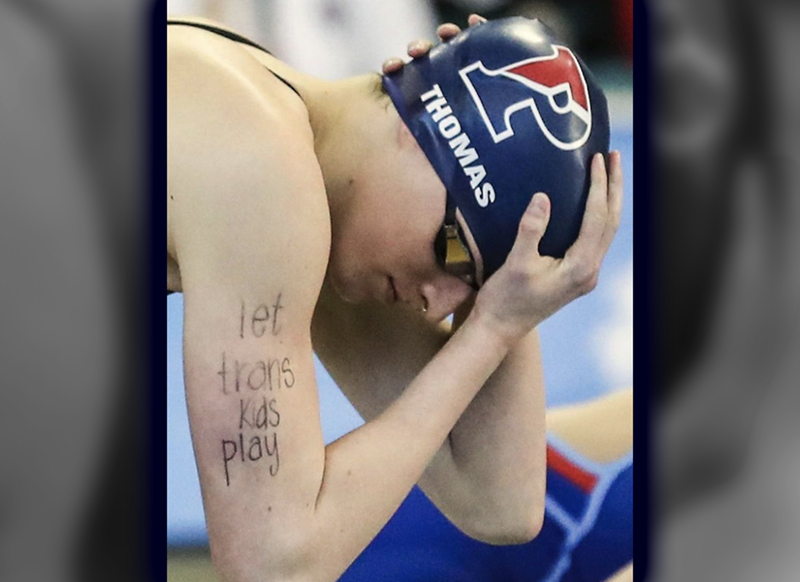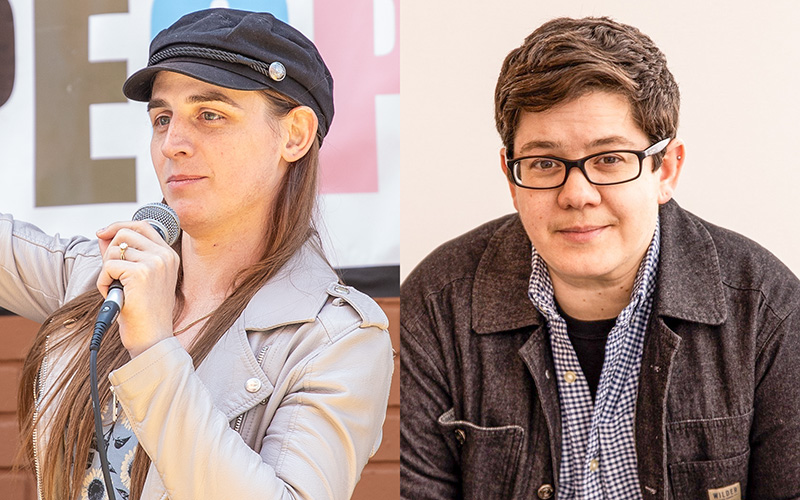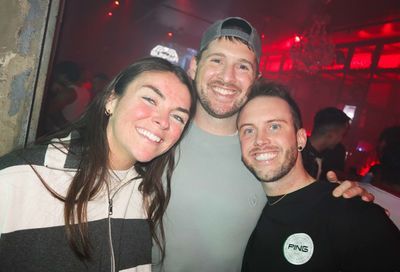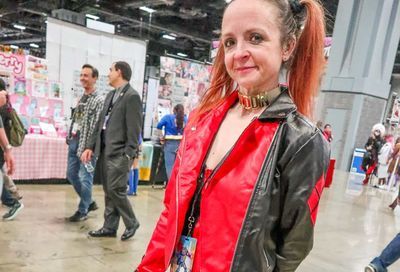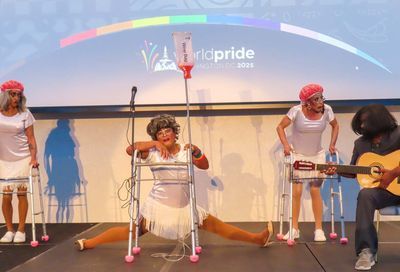D.C. Attacks Prompt Meeting on Crime
Activists gather to brainstorm solutions to ongoing anti-LGBT attacks
Local activists, community members, business owners and officers of the Metropolitan Police Department (MPD) gathered at The DC Center, Washington’s LGBT community center, Friday to discuss possible responses to several recent anti-LGBT attacks.
Earline Budd, of the transgender-services agency Transgender Health Empowerment, chaired the meeting. David Mariner, executive director of The DC Center; Richard J. Rosendall of the Gay and Lesbian Activists Alliance (GLAA); Nico Quintana of the DC Trans Coalition (DCTC); Ruby Corado of Casa Ruby; and Sterling Washington from the Mayor’s Office of GLBT Affairs were also part of the meeting of about 30 people.
”Unfortunately, we find ourselves coming together again to condemn violence against the LGBT community, and specifically transgender women of color,” Quintana said to the audience.
Recent attacks discussed at the meeting involved a transgender woman stabbed 35 to 40 times June 21, a transgender woman fatally shot June 22, a transgender woman who suffered a non-fatal bullet wound June 27, and a gay man beaten June 23 while wearing his drag-entertainer attire. After the meeting, however, on June 29, two more transgender woman were assaulted.
Budd warned the audience that anti-transgender attacks typically tend to increase in the summer, as do the number of overall crimes, but said it was important to seek community feedback in order to take needed steps to prepare for the next anti-transgender attack that occurs in the District. In particular, Budd emphasized the need for outreach to those who might be at risk, such as transgender women who are out on the streets at night or in the early morning hours.
”We’ve got to get involved, and the biggest thing is making the trans community aware that these things are happening, because there are a lot of transgender women who know absolutely nothing of any of the events we are talking about,” Budd said.
At times, the meeting roiled, as Rosendall called for calm. Many in the audience vented their anger specifically at Earl Hooks, a public relations representative who attended the meeting and spoke on behalf of Manny & Olga’s restaurant, where the gay man, Miles DeNiro, who performs as Heidi Glüm, was beaten.
Local activist Danielle King, as well as other transgender audience members, seemed to take offense at Hooks’s characterization of the incident, asking Hooks why employees of Manny & Olga’s did not step in to stop the fight or call 911, which, according to a viral video clip of the fight, continued for several minutes.
”Why did you allow this incident to occur, instead of proactively addressing hate crimes, or hate or violence within your store?” King asked during an exchange with Hooks. ”My other concern is how do you employ individuals who are not human enough to protect other individuals, or at least pick up the phone and advocate for them by calling the police?”
The audience’s anger spilled over when Hooks began to expound the company’s policy of not putting employees in danger, with audience members countering that an employee may have safely phoned the police.
”No one asked you to put anyone in danger,” Mariner said tersely.
Hooks maintained that employees did contact police, though he could not say whether a call to police came from the restaurant’s main phone or an employee’s personal cell phone.
”Our policy is not to touch anyone that comes into the store,” Hooks said of the company’s policy regarding fighting. He expressed uncertainty as to the specific policy regarding intervention when acts of physical violence occur, but said that the determination of when and how to get involved is often left to the discretion of employees, who may be trying to follow the lead of senior staff or management.
”Often times, we’re always able to look at video, and look at something after the fact, and talk about what we would have done or what we should have done,” Hooks said, promising that the restaurant would seek to institute training for its employees to better deal with such situations in the future. ”What it is up to us to do now is take this particular instance, learn from it, make sure we do have the proper policies in place, make sure we do know how best effectively to respond to physical actions that could involve our employees as well, and learn some of that from the Police Department. Because we’ve had instances where they don’t want us to get involved because it then escalates.”
But the activists didn’t just vent their frustrations over the recent spate of anti-LGBT attacks, but used the meeting as a brainstorming activity to propose actions to help combat bias-motivated crimes. Budd, for example, proposed LGBT-cultural-sensitivity training for employees of area establishments.
D.C. Councilmember Tommy Wells (D-Ward 6), who chairs the Committee on the Judiciary and Public Safety, appeared during the brainstorming session seeking about what the D.C. Council can do legislatively to better address the needs of transgender citizens.
”To a degree we’ve made some progress, but now and again we take two steps back,” Wells said. ”When we hear about the amount of violence that has occurred, we’ve taken two steps back. … I know we’ve made a lot of progress on gay and lesbian rights, but we still have a long way to go on transgender rights. We have to get smarter and better about that, but I also believe that, at least in D.C., we’re a city where we can do it.”
Some of the more popular proposals generated at the meeting included investing substantial resources into training, not only for police but across government agencies; organizing a social media forum or message board where people could learn about recent incidents in order to take precautions; submitting victim- or community-impact statements to judges presiding over bias-crime sentencing; and using social media to help document cases where anti-LGBT violence occurs.
King, a victim of violence, recounted her struggles with navigating the bureaucracy of support systems already in place that are intended to serve crime victims, indicating a need for reform in those systems. Other activists, including Nick McCoy and Rosendall, also emphasized the need for better communication among various advocacy groups and ways to provide more opportunities for those transgender residents without gainful employment, particularly those who have been forced into survival sex work.
”I think it is important that there is a proactive approach from the agencies that may have the ability to resolve, or at least attempt to, the issue of violence in the LGBT community,” said Corado, who described the ongoing fight against bias-motivated violence as ”one of those never-ending issues in this city.”
Support Metro Weekly’s Journalism
These are challenging times for news organizations. And yet it’s crucial we stay active and provide vital resources and information to both our local readers and the world. So won’t you please take a moment and consider supporting Metro Weekly with a membership? For as little as $5 a month, you can help ensure Metro Weekly magazine and MetroWeekly.com remain free, viable resources as we provide the best, most diverse, culturally-resonant LGBTQ coverage in both the D.C. region and around the world. Memberships come with exclusive perks and discounts, your own personal digital delivery of each week’s magazine (and an archive), access to our Member's Lounge when it launches this fall, and exclusive members-only items like Metro Weekly Membership Mugs and Tote Bags! Check out all our membership levels here and please join us today!




